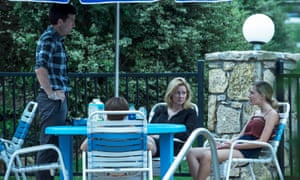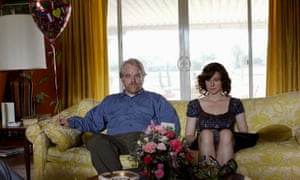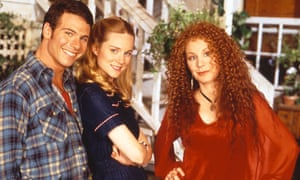Laura Linney: 'Having a child later in life has been wonderful' | Television & radio
It is a mark of how resistant she is to typecasting that when someone stops Laura Linney in the street and says “I love you in … †she never knows how the sentence will end. “There are the Tales of the City fans, and they’re rabid,†she says. “There are the Love Actually fans, who are fantastic. There’s the John Adams group. There’s the indie crowd â€" You Can Count on Me, The Savages, The Squid and the Whale. And then there’s the theatre people.â€
If there is a common strand to her roles it is their marginality; time and again she gets at the subtle agonies of women who are failing but not spectacularly so. The movie for which I remember Linney best is The Savages, from 2007, in which she played a dismal, angry, disappointed woman trying to get her aged father into a home. At one point, she pretends to her brother, played by Philip Seymour Hoffman, that she has won a Guggenheim fellowship â€" and Linney is so convincing, so tortured in her dogged defence of the lie, even as all those around her see through it, that even now I blush to remember those scenes. “That was great writing,†she says. “Working with Phil was a dream. And we became very close. It was heaven. That’s what you hope for. Doesn’t happen very often.â€
When Linney received the script for Ozark, the new Netflix series in which she stars, with Jason Bateman, as one half of a professional couple who get caught up with a Mexican cartel, she liked the premise. But, in a way that she describes as “typical†of “a female character in a male-driven showâ€, she considered her character, Wendy, underwhelming. She made it clear that if she was to accept the part, it needed fleshing out. Linney is 53 and has about her the cheerful, slightly steely snap of someone who does not need to raise her voice to get what she wants. Wendy was duly rewritten. The story follows the family when they flee from Chicago to the Lake of the Ozarks in central Missouri, to appease the drug cartel for whom her husband, a financial adviser, has been money laundering.
A big part of the attraction was the opportunity to work with Bateman, best known for playing the straight-man protagonist in the cult US sitcom Arrested Development. “I suspected he had a much larger range than he’d been allowed to express,†she says. “I always felt this about Hugh Grant, too. When we made Love Actually, I was like, ‘So when are you going to do a drama?’ And he would be like, ‘No, no, no, no.’ And he didn’t and didn’t â€" I mean I haven’t spoken to him in 12 years â€" but then he did the movie [Florence Foster Jenkins] with Meryl [Streep], and I hear he’s doing something else now that is dramatically based. And I’m really happy to hear that.â€

For her own part, Linney is now at a point in her life where she won’t spend time around people she doesn’t like and admire. There is no avoiding it when one is younger, she says, sometimes due to a lack of alternatives, sometimes due to a lack of judgment, but finding oneself on set with the wrong people is hideous. Her first criterion for a job is this: “People who are like-minded and have a similar taste, and a similar definition of what’s good. Because what’s good to someone is terrible to someone else and if you’re working with people who don’t want what you have to offer, that is demoralising and a very lonely feeling. You just want to crawl into a hole.â€
By instinct, she is a theatre person; TV and film have been “the great surprise†of her life, not merely the fact she has been so successful â€" three Emmys and three Oscar nominations â€" but that she has come to enjoy it. Growing up, Linney had before her the example â€" and perhaps the cautionary tale â€" of her father, Romulus Linney, a prolific playwright who won two National Critics awards but who, says his daughter, was often very gloomy about the state of his career. “Being a writer is not a comfortable thing to be and I watched my father really struggle. He was artistically successful, but never commercially, and it was not always easy for him. And he was not always an easy person. He was wonderful, and also very difficult.â€
Linney’s mother was a nurse at Memorial Sloan Kettering, a cancer hospital on the east side of Manhattan, and her parents divorced when she was very young. She grew up travelling on the cross-town bus from her mother’s apartment, where she lived, to see her father on the west side. They were so very different, she says, that “sometimes I would feel like the parts of me that are like my mother would be at war with the parts of me that were like my fatherâ€.
She describes her mother as “friendly and warm, and beautiful and feminine, and from the southâ€. But above all, heroic. “My mother raised a child as a single woman in the 1960s and 70s in Manhattan, with a full-time job. And I was OK. I didn’t fall apart or have problems with drugs. I did OK in school. And I’ve turned out OK. And that’s largely because of her.â€

It took Linney a long time to admit to wanting to be an actor, because she thought it sounded so grandiose an ambition. She makes a face and puts on a petulant voice: “‘I’m going to be an actress.’†After studying at Brown University in Rhode Island, she returned to Manhattan to study theatre at Juilliard and was in full-time education until she was 26. “I worked back stage. I did a lot of theatre. I studied, I learned.†There were a few small parts in movies such as Lorenzo’s Oil and Dave. Then in 1993, she appeared in a TV adaptation of Armistead Maupin’s Tales of the City and was suddenly famous â€" but for a long time, screen work felt alien. “Cameras scare me. But the technical aspects of working in film and TV, telling a story in a disjointed way, I find interesting and fun.â€
TV these days is particularly challenging. Nine years ago, when Linney made John Adams, the HBO series that won 13 Emmys, it was under the stewardship of a single director, Tom Hooper, and the entire series had been written before a single minute was filmed. For Ozark, as with most TV shows in today’s high turnover environment, Linney committed on the basis of a single script and started filming while the end of the series was still being written.
She nearly turned down the show on the basis of geography. Ozark films in Atlanta and she didn’t think she could be so far from her son. After many years of trying, Linney had Bennett at the age of 49, and when the script first came to her, she said: “I can’t, I won’t be away from my child for that long.†She didn’t consider forfeiting a job on this basis a particular hardship. “I’m certainly not an advocate for having children later, but for me, it’s been wonderful and I’m deeply grateful. People would say to me, ‘Your life’s going to change.’ Good!†She laughs. “I want my life to change.â€
In the end, she realised that if she took a job in New York, she would almost certainly see less of Bennett than she would filming on location, as was the case recently when she appeared in a play on Broadway (The Little Foxes, with Cynthia Nixon). “In New York, I would be on set five days a week, probably all night Friday into Saturday. I’d be wrecked Saturday and I’d have Sunday with him.â€
Instead, she had it written into her Ozark contract that she would take four days off every seven to go back home to Brooklyn. Linney’s husband Marc, an estate agent she met at the 2004 Telluride film festival, picks up the slack and her mother still lives in Manhattan. The relationship between her mother and son is something she finds immensely moving. “She is her best self with him. My heart swells when I see them together.â€

In fact, she says, there is only one downside to having a child this late, “and that is the bittersweet reality of chronology. I hope to prepare him in a way that whenever ... I mean, anybody could die at any moment, but you know, my being alive when he’s 50 is unlikely. Even 40 is unlikely. But other than that, there’s no downside. None. I can remember being awake at 4.30am with him when he was an infant and loving it. When you don’t think it’s going to happen for you and somehow it does, there is a spiritual aspect that’s undeniable. You don’t take it for granted.â€
Work still matters but even before Bennett, Linney had reached a point of perspective on the acting industry. “You’re a human being, so you’re going to be nervous, and you’re going to doubt, and fret. The way I deal with that is I just go to work. The way you get rid of the anxiety is to demystify it, and get involved, and realise that it’s not about you.â€
This sounds like a valuable lesson, but is surely less true for something as personal as acting than for, say, accountancy. “It depends on why you do what you do,†says Linney. “If you want to be a business or a brand, if you are playing parts based on [the demands of] your career, rather than on what’s interesting, then it is all about you.†And, of course, she says, “a lot of it is out of your control. But you try to learn something, you try to have a good time, you try to contribute.†She smiles her brightest smile, that is full of warmth and still vaguely intimidating. “And then you do the best you can.â€
• Ozark is now showing on Netflix.

0 Response to "Laura Linney: 'Having a child later in life has been wonderful' | Television & radio"
Posting Komentar